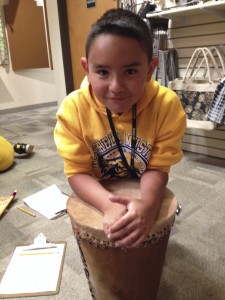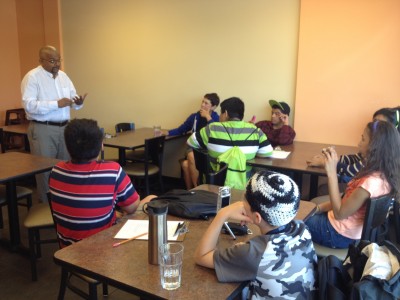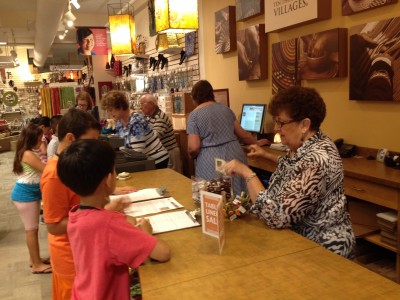The community became the curriculum for seventy 4th – 8th grade English Language Learners in the July 7 – 25th, Summer ESL Academy (SESLA). Through site visits, conversations, and informal gatherings, kids and adults came together to discuss their educational and career choices and built friendships and literacy skills in the process. Ten businesses on the corner of Packard and Platt and Ten Thousand Villages in downtown Ann Arbor generously welcomed students through their doors and shared their knowledge about life and work. In response, students created informational promotional brochures for the businesses—the kind of brochure that customers pick up at the cash register—and, in the process, learned to refine their writing and technology skills.

Students from Mitchell, Scarlett, Carpenter, Pittsfield, and Allen participated in the three week summer program, designed by AAPS teachers Sai Sajjadi, Candy Justyna and Barbara Kalisewicz, University of Michigan teaching interns, and UM faculty members Dr. Catherine Reischl and Dr. Debi Khasnabis, as part of the Mitchell Scarlett Teaching and Learning Collaborative, the partnership between AAPS and the UM School of Education, now beginning its 5th year. The SESLA program, funded by Title III federal funding, is intended to prevent “summer slide” and help students continue to improve their language and academic skills in a highly interactive setting.
In this unit, titled “Making a Living/Making a Life.”, 5th – 8th graders at the beginning, intermediate, and advanced levels of English, walked 6 blocks from Scarlett to restaurants, beauty salons, grocery stores that specialized in foods from particular cultures, and even a car re-sale lot on the corner of Packard and Platt and began conversations with the owners, many of whom are immigrants themselves. Drawing on “culturally responsive” pedagogies that view students’ families and communities as resources, teachers taught students to interview store owners about their life choices and work. Students took written notes, photos, and video to record what they had learned. They also ate a few quesadillas and samosas, drank a little mango juice, and learned techniques for eyebrow plucking and selling a fine used car! Participating stores included: Mansha’s Salon and Spa; Aladdin’s Market; City’s Pizza and Subs; Binh’s Place; Tmaz Taqeria and Goodies Grocery Store; Cromax Automotive; Golam Produce Market and Hut-k Chaats Nutrilicious Indian Food.

Drawing on information gathered over several visits, students worked in groups using computer graphics programs to produce high-quality brochures to promote the businesses. These brochures were shared at a Family Celebration on July 24th, when business partners were honored and students informally presented their brochures to an audience of more than 175 people who browsed tables displaying wares from each store or restaurant. All of this work supported informational literacy learning goals named in the Common Core State Standards.
Fourth grade students participated in a similar project, but focused on learning about “fair trade” products. Ten Thousand Villages, a fair-trade store on Main Street staffed almost entirely by volunteers, hosted the students. Kids delighted in choosing a product that they found particularly compelling, learning about the people across the world who had created the product and the working conditions and fair trade practices that are required to be in place. Fourth graders also produced brochures about their products that were given to the store to be shared with customers.

This content-based ESL program also included a morning of interviews with adults in professional roles in the community, many of whom were also immigrants. These included several lawyers, a thoracic surgeon, the vice-president of the YMCA, a computer application programmer and others. Students practiced interview skills prior to this event and put them to use as they explored a range of possibilities for their own lives in conversation with adults. All students participated in a field trip to the University of Michigan School of Engineering to learn about math and science related careers. Throughout the program, students created life maps, highlighting key events in their lives so far and, by the end of the three weeks, they added possible careers they are considering and the educational moves they will need to make to achieve these goals.

Be the first to comment